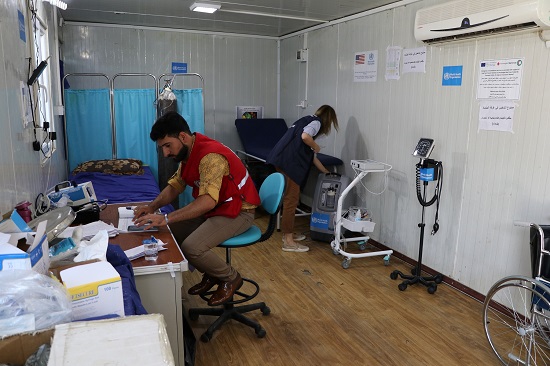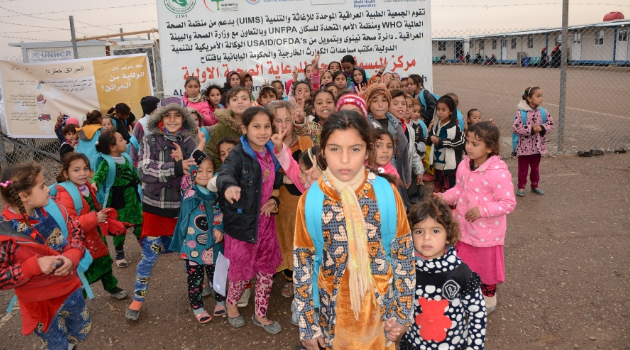More than 1.9 million Iraqi children in high risk governorates to be vaccinated against polio
On Sunday, Iraqi health authorities, in partnership with the World Health Organization (WHO) and UNICEF began a mass polio vaccination campaign targeting more than 1.9 million children under the age of five.
The campaign will be conducted in locations across Iraq, despite the ongoing COVID-19 pandemic which, like previous disease outbreaks and humanitarian emergencies has disrupted access to essential health services, including routine immunization. The campaign is urgent because even brief interruptions of vaccination programmes leave cohorts of infants unprotected, making outbreaks of vaccine-preventable diseases, like polio and measles more likely.
“The complexity of ensuring that children in Iraq remain safe from vaccine-preventable diseases while at the same time responding to COVID-19 is enormous, but we must continue to do all that we can to protect children against avoidable suffering and death caused by vaccine-preventable disease. WHO and its partners are working past the COVID-19 challenges by ensuring continuity of vaccination efforts against childhood threats such as polio” said Dr Adham Ismail, WHO Representative for Iraq.
“The Oral polio vaccine will be safely delivered both door to door and at fixed points in health facilities to ensure that we reach all children under the age of five regardless of their previous vaccination status. We want to make sure that no no child is left behind, no matter where they are,” added Dr Adham.
WHO supported the development of micro plans to guide vaccination teams day by day, mobilized and trained 862 supervisors and more than 4294 vaccinators to carry out the campaign. In addition, it is also paying all the vaccination costs including transportation and other incentives to ensure that all children are reached.
In order to ensure that the appropriate precautions are taken to maintain COVID-19 infection prevention and control (IPC) during the campaign, UNICEF trained all vaccinators in IPC skills and equipped many of them with personal protective equipment in order to ensure their safety and the safety of the target communities.
In addition, UNICEF donated the entire stock of polio vaccines for the campaign and has provided the equipment needed to keep vaccine doses at the right temperature, thereby ensuring their effectiveness. It also developed educational materials such as informational videos and posters, to raise awareness about the importance of immunization and encourage caregivers to vaccinate children. In addition, UNICEF trained 400 community volunteers to raise awareness, track rumours, and counter misinformation with accurate information about the vaccine and its benefits.
“Along with our partners in government, we have a responsibility to make sure that communities are engaged, aware that vaccines are the most cost-effective and safe way of protecting children against many diseases, and that they are mobilized to participate in vaccine delivery programmes. Every child born has a right to a healthy life,” explained Ms Hamida Lasseko, UNICEF’s Representative in Iraq.
The five-day campaign will target children in 46 districts in sixteen governorates, including Baghdad (Baghdad-Resafa and Baghdad-Karkh), Babylon, Anbar, Dahuk, Erbil, Kerbala, Kirkuk Missan,Muthanna, Thi-Qar, Najaf, Ninewa, Salah Al-Din , Suleymaniya, Wassit and Basra. The locations were selected based on the health risks of children in each, polio surveillance indicators, children’s immunisation profiles and existing gaps. Other factors considered included the population numbers, geography and environmental risks.
(Source: UN)
The post 1.9m Iraqi Children to be Vaccinated against Polio first appeared on Iraq Business News.


